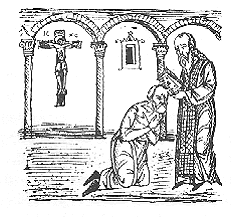
One question that I feel many non-Christians (and even some questioning Christians) ask has to do with the faithful not practicing all the Jewish laws. In one of my religious studies classes, my task was to find the answer to that question in chapters 5 and 6 of St. Paul's Letter to the Galatians.
Below is the essay that addresses the issue:
In his letter to the Galatians, Paul writes the members of the church that “for freedom Christ has set us free; stand fast therefore, and do not submit again to a yoke of slavery” (Gal 5:1). He is speaking, of course, not of actual enslavement of the body, but the enslavement of the human soul. That enslavement of which Paul writes is the enslavement of the Torah bound people.
To be free in Christ is to live free of the Torah and of the Jewish Law. Paul discusses this freedom at length in Galatians. To live by the Law rather than by the Spirit as Christ commands us, is to live by the flesh. We do not live according the flesh only through “fornication, impurity, licentiousness, idolatry, sorcery, enmity, strife, jealousy, anger, selfishness, dissension, party spirit, envy, drunkenness, carousing, and the like” (Gal 5:19-21). When we deny the Spirit and its fruits as the the way by which we may “inherit the kingdom of God” (Gal 5:21), and exalt and rely upon the Law as the way to such an inheritance we are living according to the flesh just as through the above mentioned works.
While living by the Torah and by the Law is not in and of itself sinful, it is the exaltation of the Law as a means of salvation that is the sin. Paul makes this clear to us when he writes that “in Christ Jesus neither circumcision nor uncircumcision is of any avail,” but that “faith working through love” is the new Law (Gal 5:6). Paul’s theology of love begins to emerge here. We all live on earth in our flesh, in our earthly bodies. If Paul writes for us not to live according to the flesh but by the spirit and not according to the law but to freedom, how do we conduct our earthly bodies in a way that is in accordance with the Spirit? If “faith working through love” is the new Law by which we must live, then we must obey this as our new Law (Gal 5:6) so that “if we live by the Spirit, let us also walk by the Spirit” (Gal 5:25). Paul further unfolds his theology of love commanding us to “have no self-conceit, no provoking of one another, no envy of one another” (Gal 5:26).
Paul’s theology of love tells us that a sin is an act against love, for “faith working through love” is the new Law (Gal 5:6). Going against the love of self is to deny yourself as a temple of the Spirit or to willfully corrupt the temple of the Spirit. To go against the love of others is to “grow weary in well-doing” a sin against which Paul warns us (Gal. 6:9). To go against love of the Spirit is to go against God himself, as the Spirit is the gift of the new Law from God. To live by Paul’s theology of love is to “live by the spirit” and to “walk by the spirit” (Gal. 5:25). This gives us an entirely new approach to sin and the avoidance thereof. The new Law is not one of forbiddance but one of allowance. In its very concept it guides us toward works of love, rather than away from acts of sin. It gives us freedom to live by the Spirit through our spirit to guide our flesh, rather than live by the Law through our already corrupt flesh, resulting in a faulty guide for our spirits.
While we must live in our flesh, but we must not live by the flesh, for Paul writes that “he who sow to his own flesh will from the flesh reap corruption” (Gal 6:8). However, while living in our flesh, if we live not by it but by the Spirit then “from the Spirit [we] will reap eternal life” (Gal. 6:8). In order to truly live in accordance with the Spirit, we must not live for the flesh but in the flesh for the Spirit.










